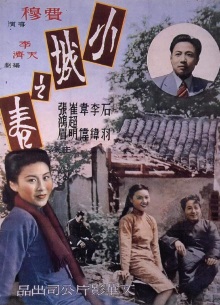
This is a very old Chinese film that I added to the list due to its classic status and its international reputation as one of the finest Chinese films ever made. However it predates the Communist victory by just a hair and as such it lacks the leftist sentiment that pervades the Chinese films of its era. This caused it to be sidelined by the Communists and its celebrated status today seems to be a relatively recent affair.
At the end of the Sino-Japanese War, the formerly prosperous Dai find themselves in reduced circumstances with their family home partially ruined. The husband Liyan is physically weak and spends his days in the garden recalling past glories. His wife Yuwen dutifully performs her chores but feels trapped in a loveless marriage and a tiny,, dreary town. Only Liyan’s younger sister Xiu who is still at school has any life in her as she doesn’t recall what life was like before the war. Rounding out the household is their last remaining servant Lao Huang. One day a classmate friend of Liyan named Zhichen who is now a doctor visits the family. The two friends are overjoyed to meet each other again and Liyan immediately invites him to stay over for a few days. However it turns out that Zhichen and Yuwen were childhood neighbors and sweethearts before the war. It soon becomes clear to all that they still have feelings for each other.
This is a tiny film with only the five characters ever appearing and with only two locations: the family manor itself and the ruins of the town’s walls. As Yuwen is the point of view character, the isolation and sense of confinement helps reinforce the theme of her being miserable in a monotonous, colorless life. Still it’s disappointing not to be able to see anything else of the world during that era and it feels downright odd that the characters talk about the market and the town but the only thing we see apart from the house is the same section of broken wall over and over again. All the same, it makes good use of what is evidently a very limited budget. The acting style is archaic and the plot all too melodramatic and predictable but it still manages to evoke sufficient tension and emotion to satisfy modern audiences.
Despite the small scale of the drama, I suppose the film does manage to capture something like the spirit of the times especially as it is set in the small window between the end of the war and the onset of the Communist era. The household proudly maintains their one last servant even as Liyan bemoans that the once rich family has been so reduced. The expectation at that time seems to be that everything will go back to normal soon and the family will rebuild which of course turns out to be wrong as the Dai family most certainly would count as landlords under the Communist regime. The film is also remarkable in being able to generate drama and tension without making any character villainous. Liyan remains sympathetic even after knowing about Yuwen and Zichen’s feelings for each other. As Zichen’s friendship with Liyan is genuine and Yuwen takes her wedding vows seriously, the setup is a reasonable conflict between the desires of the individual and the good of the social group. It predictably ends up being an affirmation of Asian values of course but it does so in a satisfying manner without being preachy about it.
Decent as this is, I’m not convinced that it deserves being known as a great film if not for its particular place in Chinese film history. I think that when interest in this film was revived in the 1980s, it stood out due to how different it is from the other films of that era, steeped as they are in Communist ideology. In that sense, it’s a vision of an alternative China that could have been but never came to pass.